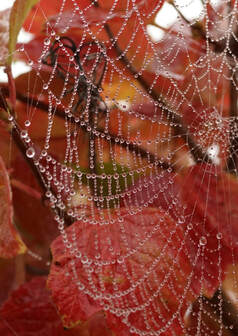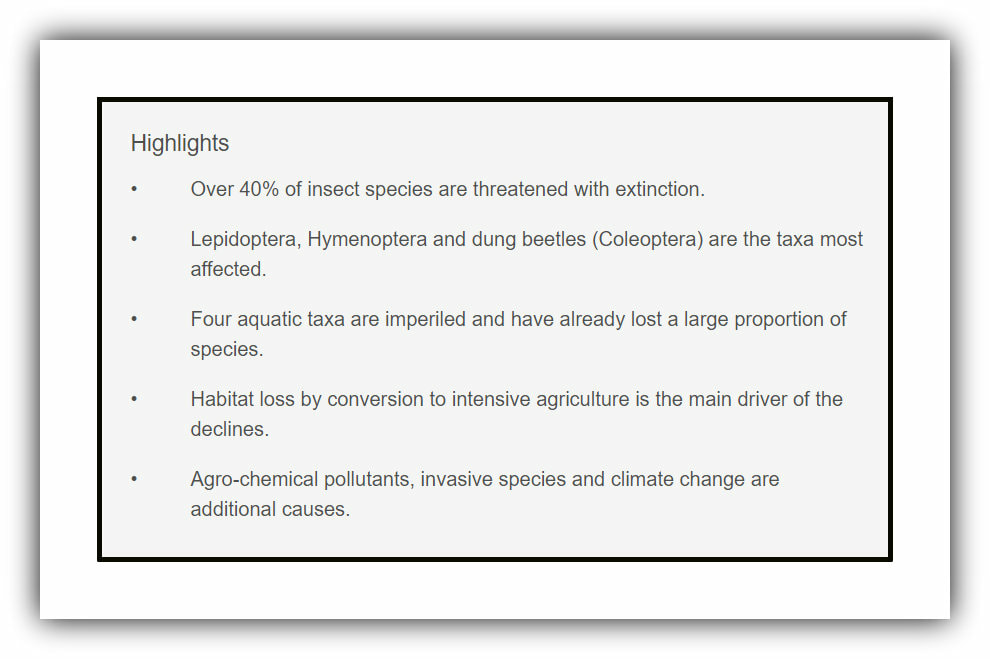Massive insect decline Nature's Jewels - by Betsy Seeton Nature's Jewels - by Betsy Seeton A study that was published in 2018, but recently revised is making news in February 2019 and warns that insect populations are drastically declining around the earth due to pesticide use and other factors. I'm trying to access the actual study, but the cost was over $50, so I've written to see if I can access it for education purposes to post here. Meanwhile, other news outlets all over are discussing the study.  The report was co-authored by scientists from the universities of Sydney and Queensland and the China Academy of Agricultural Sciences. They examined dozens of existing reports on insect decline published over the past three decades. They extrapolated causes for the falling numbers and the conclusions drawn said the effects of insect decline are so drastic in number and time span and are no less than catastrophic. It likely means life as we know it is on a short path to extinction if humans do not make changes. Key causes of the decline included “habitat loss and conversion to intensive agriculture and urbanization,” pollution, particularly from pesticides and fertilizers, as well as biological factors, such as “pathogens and introduced species” and climate change. AbstractBiodiversity of insects is threatened worldwide. Here, we present a comprehensive review of 73 historical reports of insect declines from across the globe, and systematically assess the underlying drivers. Our work reveals dramatic rates of decline that may lead to the extinctionof 40% of the world's insect species over the next few decades. In terrestrial ecosystems, Lepidoptera, Hymenoptera and dung beetles (Coleoptera) appear to be the taxa most affected, whereas four major aquatic taxa (Odonata, Plecoptera, Trichoptera and Ephemeroptera) have already lost a considerable proportion of species. Affected insect groups not only include specialists that occupy particular ecological niches, but also many common and generalist species. Concurrently, the abundance of a small number of species is increasing; these are all adaptable, generalist species that are occupying the vacant niches left by the ones declining. Among aquatic insects, habitat and dietary generalists, and pollutant-tolerant species are replacing the large biodiversity losses experienced in waters within agricultural and urban settings. The main drivers of species declines appear to be in order of importance: i) habitat loss and conversion to intensive agriculture and urbanisation; ii) pollution, mainly that by synthetic pesticides and fertilisers; iii) biological factors, including pathogens and introduced species; and iv) climate change. The latter factor is particularly important in tropical regions, but only affects a minority of species in colder climes and mountain settings of temperate zones. A rethinking of current agricultural practices, in particular a serious reduction in pesticide usage and its substitution with more sustainable, ecologically-based practices, is urgently needed to slow or reverse current trends, allow the recovery of declining insect populations and safeguard the vital ecosystem services they provide. In addition, effective remediation technologies should be applied to clean polluted waters in both agricultural and urban environments.
0 Comments
Your comment will be posted after it is approved.
Leave a Reply. |
by Betsy Seeton
BLACK HISTORY
MONTH SHOULD BE EVERY M O N T H This is a blog covering and discovering injustice anywhere. It's about race, racism, hatred, love, tolerance, intolerance, ignorance and wisdom. It's about climate change, and all things earth, all things people, plants and animals. It's about change makers and light shiners. It will follow The North Star and report here.
B.L.S.I would like to think that, "One day our descendants will think it incredible that we paid so much attention to things like the amount of melanin in our skin or the shape of our eyes or our gender instead of the unique identities of each of us as complex human beings," as Franklin Thomas said. Archives
May 2021
Categories
All
|






 RSS Feed
RSS Feed
